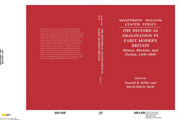Book contents
- Frontmatter
- Contents
- Preface
- WOODROW WILSON CENTER SERIES
- 1 Introduction
- 2 Precept, example, and truth: Degory Wheare and the ars historica
- 3 Truth, lies, and fiction in sixteenth-century Protestant historiography
- 4 Thomas More and the English Renaissance: History and fiction in Utopia
- 5 Little Crosby and the horizons of early modern historical culture
- 6 Murder in Faversham: Holinshed's impertinent history
- 7 Foul, his wife, the mayor, and Foul's mare: The power of anecdote in Tudor historiography
- 8 Experience, truth, and natural history in early English gardening books
- 9 Thomas Hobbes's Machiavellian moments
- 10 The background of Hobbes's Behemoth
- 11 Leviathan, mythic history, and national historiography
- 12 Protesting fiction, constructing history
- 13 Adam Smith and the history of private life: Social and sentimental narratives in eighteenth-century historiography
- 14 Contemplative heroes and Gibbon's historical imagination
- Contributors
- Index
- Titles in the series
9 - Thomas Hobbes's Machiavellian moments
Published online by Cambridge University Press: 04 August 2010
- Frontmatter
- Contents
- Preface
- WOODROW WILSON CENTER SERIES
- 1 Introduction
- 2 Precept, example, and truth: Degory Wheare and the ars historica
- 3 Truth, lies, and fiction in sixteenth-century Protestant historiography
- 4 Thomas More and the English Renaissance: History and fiction in Utopia
- 5 Little Crosby and the horizons of early modern historical culture
- 6 Murder in Faversham: Holinshed's impertinent history
- 7 Foul, his wife, the mayor, and Foul's mare: The power of anecdote in Tudor historiography
- 8 Experience, truth, and natural history in early English gardening books
- 9 Thomas Hobbes's Machiavellian moments
- 10 The background of Hobbes's Behemoth
- 11 Leviathan, mythic history, and national historiography
- 12 Protesting fiction, constructing history
- 13 Adam Smith and the history of private life: Social and sentimental narratives in eighteenth-century historiography
- 14 Contemplative heroes and Gibbon's historical imagination
- Contributors
- Index
- Titles in the series
Summary
… and the weak yield to such conditions as they can get.
– Thomas Hobbes's translation of The History of the Grecian War
Written by Thucydides (1629)Behemoth was written in or around 1667; Leviathan was published in 1651. But I want to start earlier. Just how early one can safely start is, as we will shortly see, a difficult question. For now let us stay on safe ground. In 1629 Hobbes published his translation of Thucydides, including that most compact of all analyses of power politics, the Melian dialogue. There the Athenian ambassadors swiftly reject arguments from right, justice, or principle as irrelevant, and assume such arguments will be recognized to be so:
But out of those things which we both of us do really think, let us go through with that which is feasible; both you and we knowing, that in human disputation justice is then only agreed on when the necessity is equal; whereas they that have odds of power exact as much as they can, and the weak yield to such conditions as they can get.
There is an evident similarity between the Athenian view and Hobbes's insistence over twenty years later in Leviathan that there could be neither contract nor justice without a sovereign authority. Yet recent scholarship has tended to take Hobbes at his word when he insists that Leviathan is a work of geometrical and not historical argument, written under the influence of Euclid and not Thucydides. Consequently hardly anyone refers to the Melian dialogue when interpreting Leviathan. Hobbes the translator of history is presumed to be irrelevant to Hobbes the theorist of politics.
- Type
- Chapter
- Information
- The Historical Imagination in Early Modern BritainHistory, Rhetoric, and Fiction, 1500–1800, pp. 210 - 242Publisher: Cambridge University PressPrint publication year: 1997
- 3
- Cited by

